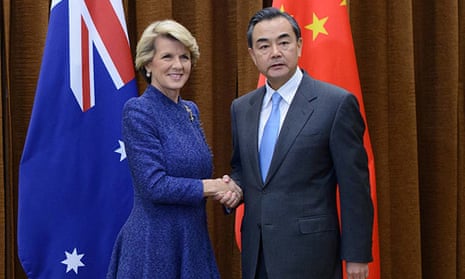Australia’s top diplomat for north Asia has described China’s public rebuke of the foreign minister, Julie Bishop, as the rudest display he has seen in his career.
It was a candid moment during a heated debate about the status of Australia’s relationship with China, in which Labor suggested the Abbott government was mishandling ties with its biggest trading partner.
Top officials from the Department of Foreign Affairs and Trade (Dfat) were questioned about the incident in December when Bishop was upbraided by her Chinese counterpart during a news conference in Beijing.
The foreign minister was criticised for “irresponsible” comments after Australia condemned China’s declaration of an air-defence zone over an island chain also claimed by Japan.
The first assistant secretary of Dfat’s north Asia division, Peter Rowe, on Thursday gave a frank assessment of the display from the Chinese foreign minister, Wang Yi.
“I have never in 30 years encountered such rudeness, actually,” he told a Senate estimates hearing on Thursday.
His superior, Dfat secretary Peter Varghese, quickly interrupted by saying foreign ministers often have robust exchanges, even if they are usually not in front of the media.
Rowe’s revelation prompted the Labor senator Sam Dastyari, who suggested it was one of a number of incidents that implied all wasn’t well between Australia and China.
He pointed to the summoning of China’s ambassador over the no-fly zone, and the government’s failure to criticise Japan after its prime minister visited a controversial war shrine that was offensive to China.
In particular, he questioned whether a trilateral communique issued in October between Japan, Australia and the US equated to a change in policy towards China.
“To play this game where you pretend this isn’t a significant communique, I just don’t think passes the believability test,” he said.
Varghese said although the Chinese had expressed their disappointment over the communique, “not one phrase” in it represented a shift in policy from Australia.
He also said the description by the Australian prime minister, Tony Abbott, of Japan as an “ally” was correct, though there were “capital A” and “small A” allies, which amused the Labor senator John Faulkner.
“The use of upper case and lower case, do I find that in some diplomatic handbook? That’s one of the most interesting things I’ve ever heard,” he said.

Comments (…)
Sign in or create your Guardian account to join the discussion